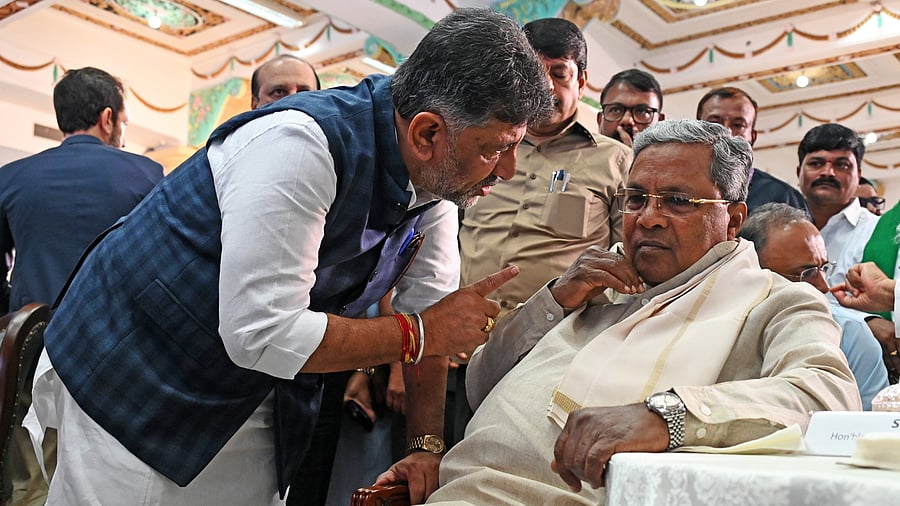
Deputy Chief Minister DK Shivakumar interacts with Chief Minister Siddaramaiah.
Credit: DH Photo
Politics has long consumed the Indian media, overshadowing all other issues crucial to society’s development. Innovations in Indian universities or the performances of athletes who are not cricketers receive scant attention. This is equally true of the media in Karnataka.
In the recent past, the media amplified a statement made by a politician about a so-called ‘September revolution’ within the Congress. What initially appeared to be a mere attention-seeking remark, rooted in his unease over D K Shivakumar’s potential elevation to the post of chief minister following Siddaramaiah’s completion of his tenure, turned out to have deeper implications.
For the Congress, after Rajasthan, Karnataka is the second state where a generational transition has become more of a liability than an asset. Even earlier, at the national level, similar shifts have resulted in high-profile exits, and Shashi Tharoor could well be the next to leave. In Karnataka, this internal indiscipline has emboldened several opportunistic Congress leaders to publicly back their preferred faction, exposing internal divisions and drawing the attention of the party high command.
Beyond the repetitive telecasts and subtle variations across news channels, the leadership debate in Karnataka has once again brought to the fore the delicate relationship between the chief minister and his deputy. This tension has triggered a ripple effect involving the party’s top leadership, like Mallikarjun Kharge, and reignited jostling among caste-based subgroups within the state Congress as they each stake their claims. As India’s grand old party, the Congress is susceptible to these micro-group politics based on caste, region, personal loyalties, and leadership. In this instance, the public outburst has served to amplify the chief ministerial aspirations of D K Shivakumar, with his supporters rallying behind his Vokkaliga identity—annoying, in the process, the widely popular AHINDA (Alpasankhyataru, or minorities; Hindulidavaru, or backward classes; and Dalitaru, or Dalits) leader Siddaramaiah, even as the Congress seeks to consolidate OBCs support in the upcoming Assembly elections in Bihar.
Politics, at its best, is a triangulation of individual interests, collective purpose, and institutional structures that guide society towards a shared future. But in Karnataka—as in much of India—this vision is unstructured and chaotic, reducing politics to a tool of self-service, devoid of ideals of true social upliftment. The ongoing tussle for leadership in the Karnataka Congress is a case in point, where personal interests and ambitions of leaders have overshadowed governance and any development agenda.
From the ST Development Corporation to MUDA, from the contractors’ lobby to housing allotment scams—allegations of corruption, favouritism, and mismanagement of funds abound. On one hand, disgruntled MLAs have accused their colleagues in the ministry of withholding development funds, prompting intervention from the party’s Karnataka in-charge, Randeep Surjewala. On the other, benefits from the party’s guarantee schemes are being diluted.
Meanwhile, Leader of the Opposition R Ashok has lambasted the Congress for its alleged loss of control over law and order, citing a 40% rise in crime compared to the previous BJP government, according to NCRB data. Amidst all this, Congress finds itself in a fragile position ahead of the upcoming elections.
Under these trying times and circumstances, renewed debate around leadership change is only compounding the party’s troubles. While Siddaramaiah focuses on displaying his strength in his hometown, the Congress appears rudderless at the national level. Kharge is increasingly seen as a figurehead, while Rahul Gandhi, the Leader of the Opposition in Lok Sabha, remains adrift with no clear political direction. His course keeps shifting unpredictably, while his sister, Priyanka Gandhi-Vadra, appears unwilling to assume a leadership role. Many of the brave and capable have already deserted the party, and Congress appears to lack any coherent strategy to tackle this leadership crisis.
Caught between generous welfare schemes on the one hand and mounting fiscal concerns on the other—including allegations of empty coffers, price inflation, rising corruption, and fresh GST demand notices—the Congress government in Karnataka is visibly struggling. Its narrative of governance and strong leadership now teeters on the edge. As the party tries to hold its ground against the BJP, the public appears to be increasingly disillusioned by soaring living costs and disjointed politics. Far from witnessing a revolution, the people of Karnataka are in fact experiencing regression. Their concerns and hopes must now await the next election—for better or worse.
(The writer is retired founder vice-chancellor of Adikavi Sri Maharshi Valmiki University)